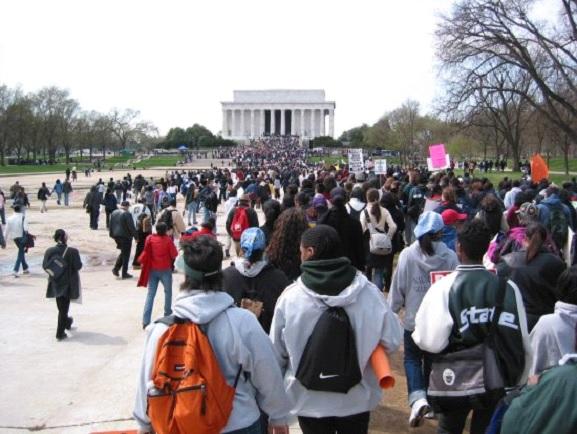Affirmative Action Should Remain, Protest Should Stop

protesters gather in Washington D.C. following the 2003 Supreme Court Decision to uphold Affirmative Action. Photo from Wikimedia.
October 18, 2016
In the past few years, Affirmative Action in college admissions has been under intense scrutiny. However, the idea of removing it would be a major loss for minorities.
Affirmative Action gives students of an underrepresented minority (URM) race such as Black or Hispanic an advantage in college admissions. For example, a university might accept a Black student with a 31 ACT score over a White student with a 33 ACT score because the Black student is Black.
While this initially seems unfair, it is important to remember that URMs are at a disadvantage and Affirmative Action helps equalize this disadvantage. Affirmative Action should be kept in place until URMs and other races have equal opportunity in this country.
Those arguing against Affirmative Action should realize this point, and put themselves in the shoes of an African-American student living in poverty in a bad neighborhood, and imagine trying to succeed. It seems like a difficult task, and their placement in this position was not their fault, and is why Affirmative Action should be allowed and it makes sense to give leeway to URMs in college admissions. Amy Glicker, a guidance counselor at Mayfield High School, stated “ Affirmative Action is a very complicated issue, with a history that’s very complicated. It’s not a very clean cut answer, but the intentions are good. I’m all for making college accessible for everyone”.
Let’s take a look at the history of Affirmative Action. Following the Civil Rights Movement during the 1960s, President Kennedy instituted the idea of Affirmative Action in the United States, a policy favoring those who tend to suffer from discrimination, in this case in education.
Since then, it has evolved as a god-send to minorities struggling to get in and afford university. Recently, the common objection to Affirmative Action is that minorities with less qualifications are getting into colleges over non-minorities such as whites who are more qualified. With this in mind, it seems as if Affirmative Action is unfair, and should be abolished, but a more in-depth analysis is required.
Robert Barnes of the Washington Post wrote, “The working and middle class of African Americans both needs and deserves affirmative action to level the playing field after centuries of discrimination.”
Going back to the 1800s, the government has discriminated against blacks and Hispanics, like limiting their access to New Deal programs during the Great Depression. This leads to a disproportionate number of African Americans today having much less income, and growing in bad neighborhoods where access to education and a safe environment are not readily available. At such a large disadvantage, it Is significantly harder for an African American to get accepted a college, let alone afford it.
When the people at Pitt News observed admission rates at colleges who banned Affirmative Action, they found something interesting. Bethel Habte wrote, “Bans on the use of Affirmative Action at public research universities dropped minority admission by twenty-three percent”.
The point of Affirmative Action is to encourage diversity, while also promoting equality. Currently, NPR reports the unemployment rate for African Americans is at 8.8 percent, nearly twice the unemployment rate of whites. Affirmative Action looks to help by being an economic equalizer, after centuries of blacks being discriminated against.Whites as well as Asians are still attending college at a much higher rate than blacks, and more can be done.
Another common criticism of Affirmative Action is known as the Mismatch theory-the claim that minorities fail when they are not ready for more elite schools. However, a 2006 study by sociologists Mary J. Fischer and Douglas S. Massey found this to be false.
Fischer and Massey followed numerous underprivileged African Americans in 28 selective schools and found no evidence of them being behind in any way. In fact, in some cases, they found that some individuals actually received higher grades and had lower dropout rates than other students.
Affirmative Action isn’t an unfair advantage for minorities; it is simply trying to level out the playing field and make it fair for them.





















































